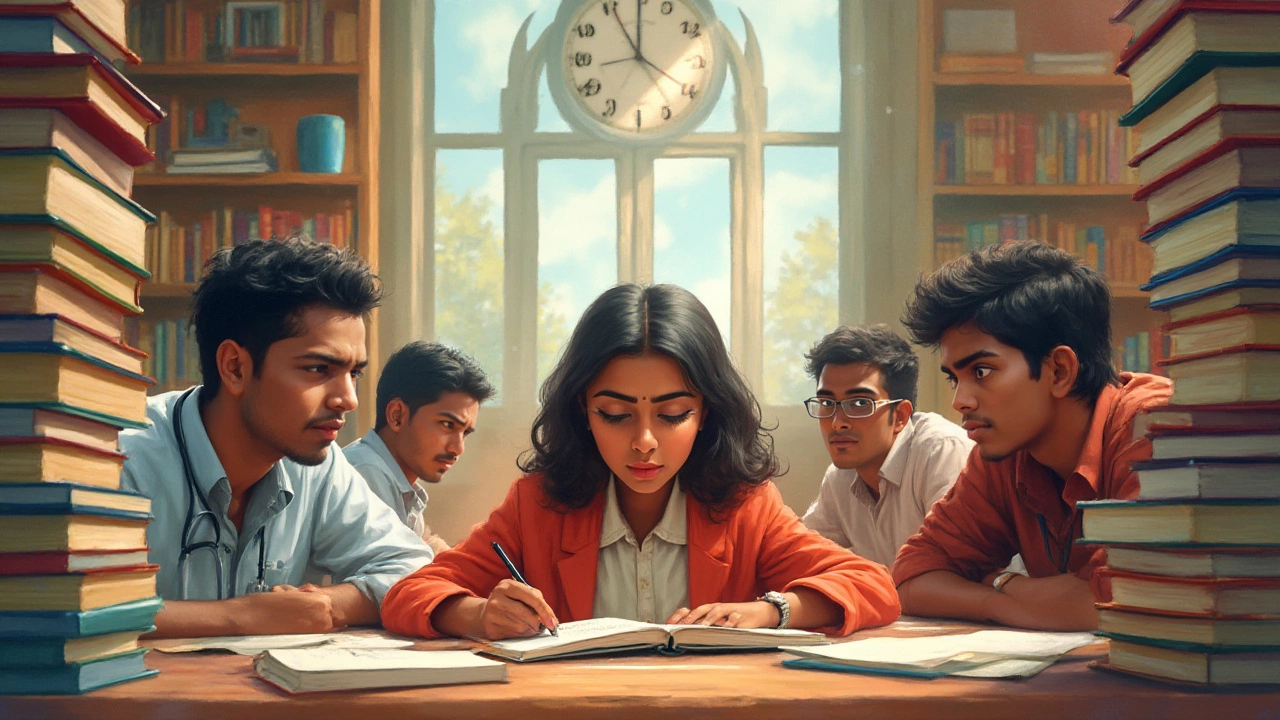If you’ve ever lost sleep before a big test, just imagine prepping for an exam that could make or break years of your life. Not all professional exams are created equal. Some have pass rates that make roller coasters look steady. Others have a reputation that sends shivers through even the calmest overachiever. Think your finals were tough? They're nothing compared to what some professionals face. People talk about the intensity of these tests—stories about red-eyed cram sessions, endless practice questions, and the gut-dropping moment of opening the results email.
The Exams That Terrorize Even the Most Prepared
When you talk about the hardest professional exams on the planet, a few big hitters always come up. The United States Medical Licensing Exam (USMLE), the All India Institute of Medical Sciences (AIIMS) entrance test, the California Bar Exam, the CFA (Chartered Financial Analyst) exams, and the Gaokao in China regularly top the lists. Each of these exams is famous (or infamous) for different reasons. For example, the CFA has a pass rate that hovers around 40% for Level I and dips even lower for subsequent levels. This test spans topics from ethics to quantitative analysis—there are stories of candidates missing out by just a fraction, sometimes by simply bubbling the wrong answer in a 6-hour marathon.
The California Bar Exam is another beast. Sure, every state’s bar is hard, but this particular one has become legend. Pass rates regularly hover below 50%, with some years falling into the 30s. It’s not just about knowing the law—you need to apply it under massive pressure. In 2020, the format shifted to a remote setting, but the anxiety didn’t budge. Law school grads across the country still approach it with full-on respect, and rightfully so.
For doctors, the USMLE isn’t just one test but a whole journey. Step 1 alone eats up a year of lives as med students work through thousands of practice questions and review books. The difference between scoring in an average band and a top score can mean the difference between landing your dream residency and scrambling to adjust career plans. AIIMS in India is even harder to break into—not just because you have to outperform others, but because the sheer volume of competition is massive. In 2023, there were over 60,000 applicants fighting for just a few hundred spots.
China’s Gaokao cranks the pressure up to 11. This national college entrance exam is considered one of the most grueling in the world. For two days straight, millions of high schoolers sit for a test that defines the next steps of their lives. Some start preparing as early as elementary school. Stories circulate of families moving cities just for better schools, or students sleeping four hours a night to study. The social weight behind this exam can’t be overstated—if you think college admissions are a big deal elsewhere, try talking to someone who sat the Gaokao.
The Mental Toll: More Than Just Studying
What pushes these exams beyond just “hard” and into “brutal” territory? The pressure isn’t only academic. The stakes are sky-high. For medical and law professionals, years of education and sometimes hundreds of thousands of dollars ride on a pass or fail. Parents, mentors, and sometimes entire families pin their hopes on a single result. That’s a heavyweight even for those who thrive under pressure.
Let’s talk about burnout. Studies by the American Medical Association show that med students prepping for Step 1 of the USMLE experience increased anxiety and sleep problems at rates much higher than their peers. One survey in 2024 revealed that over 60% of USMLE candidates felt some symptoms of depression during their prep months. These aren’t isolated cases—it’s nearly part of the culture.
CFA candidates aren't immune either. Some take years to pass all three levels. The curriculum updates every year, so your study material can be obsolete by your next attempt. Candidates often juggle work, family, and study, setting alarms for 4 a.m. reviews. Anecdotes fill Reddit about people missing weddings, birthday parties, or vacations to slog through thousands of questions.
The Bar Exam leads to its own kind of isolation. You might hear lawyers talk about months spent hunched over outlines, talking to friends only in hypothetical legal questions. The pressure doesn’t let up with retakes. If you fail, you do it all again. In high-pressure professions, some employers won’t even consider you until you’ve passed, leaving entire futures in limbo.
The weight isn’t only mental, but physical too. It's common for candidates to ignore basic self-care—eating poorly, skipping sleep, or sitting for unhealthy stretches. Medical educators now push for better mental health support than ever, but the reality is, nothing erases the test-day nerves.

Behind the Curtain: What Makes Exams So Tough?
Not all exams are brutal for the same reasons. The USMLE stands out for its breadth and depth—you can find yourself puzzling over the smallest detail about cell biology, only for the next question to ask about diagnosis based on a vague set of symptoms. It’s not memorizing flashcards; it’s application under pressure and time limits. Test-makers tweak questions constantly so you can’t just study old content and expect to pass.
The CFA is a nightmare of topics. You need to know financial ethics, derivatives, fixed income, economics, and much more. The exam is closed book, and calculators have their limits. People often say if you’re not doing hundreds of practice questions each week during prep, you’re already behind. Whether you’re more quantitative or qualitative by nature, you’re bound to find a section that feels like it was written just to humble you.
For the California Bar, it’s a combination of limited time and wide-ranging content. You get all types—essays, multiple-choice, performance tests—each designed to trip up even the best students. The essay prompts are open-ended, and it’s not enough to just list law—you have to make an argument, structure your answer logically, and spot all possible issues. Many say it’s the pressure to “think like a lawyer” at lightning speed that makes it so draining.
Let’s not overlook engineering exams like the Indian Institute of Technology Joint Entrance Exam (IIT JEE). This one has an acceptance rate of under 1%, and the math can make seasoned engineers sweat. A single silly mistake might set you back months, or even a year, before you can try again. The questions are rarely straightforward; you need to bring everything together—creativity, logic, and a tolerance for ambiguity.
Standardized tests like the Gaokao are a different monster. The problem isn’t only the content but the scale. Imagine an entire country prepping for one day. The social weight is crushing, with students’ futures and family expectations balancing on a bubble sheet. It’s a level of pressure most people thankfully never have to face.
Surviving the Monster: Tips That Actually Work
No one beats these exams by luck. There’s no secret hack, but there are smart ways to play the game. First, know the test inside and out. Find out the specific sections, types of questions, and weighting. Don’t just rely on rumor—get the actual data from official sites or those who have been through it.
Practice is non-negotiable. The best candidates do endless sample questions. Not only does this build muscle memory for the types of questions you’ll see, but it also exposes your weak spots. Consider time management your best friend. Simulate the real exam environment—timed practice, strict breaks, and even the same calculator, pen, or digital platform you’ll use on test day. It sounds silly, but this familiarity shakes off some edge-of-your-seat anxiety.
Take care of yourself. Yeah, it feels impossible when you’re racing the calendar. Even short stretches, walks, or a healthy snack can keep your focus sharper. There’s pretty solid evidence, too—a Harvard Med study from 2022 confirmed that even five-minute mindfulness exercises before a practice test improved prolonger focus among USMLE candidates compared to those who crammed non-stop.
Build a support system. Find people who have already passed, or are struggling with it right now. Online forums—whether it's for the CFA, USMLE, or Bar—offer peer advice, shared strategies, and a reminder that you’re not battling this alone. Some law grads swear that sharing outlines in small groups made the difference. Others credit their calm to a partner who forced them to take breathers or schedule a fun distraction once a week.
If you fail, don’t freak out. These exams are famous for repeat attempts for a reason. Plenty of stories feature people who tanked their first shot and went on to amazing careers. Analyze your mistakes, change up your strategy, and hit it again. Fear of embarrassment can paralyze even bright candidates—the trick is admitting that resilience is often more useful than raw intelligence.
At the end of the day, the hardest professional exams aren’t about showing you know everything. They test your ability to stay sharp under stress, improvise through the unfamiliar, and keep going when the finish line feels forever away. Conquering one might not be fun, but it sure changes what you think you’re capable of.

